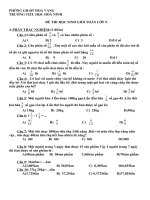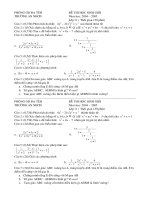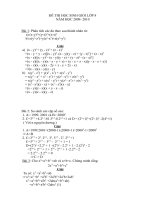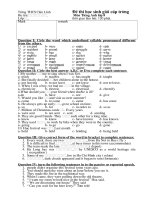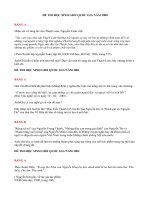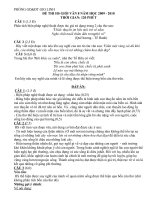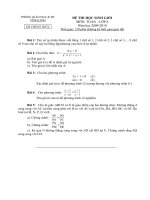De thi HS gioi 8 2012
Bạn đang xem bản rút gọn của tài liệu. Xem và tải ngay bản đầy đủ của tài liệu tại đây (145.89 KB, 8 trang )
<span class='text_page_counter'>(1)</span><div class='page_container' data-page=1>
Phịng GD-ĐT TP Bn Ma Thuột
Trường THCS Phan Chu Trinh
<b>THI THƠNG TIN PHÁT HIỆN HỌC SINH GIỎI</b>
<b> Mơn: Tiếng Anh L</b>
<b>ớp 8 </b>
<b> Thời gian 90 phút</b>
<b>Ngày 24 tháng 04 năm 2012</b>
HỌ VÀ TEÂN: . . . .
LỚP: . . . .
PHÒNG THI: . . .
SỐ BÁO DANH: . . . .
<b>GIÁM THỊ 1</b> <b>GIÁM THỊ 2</b> <b>SỐ MẬT MÃ</b>
. . . .. . . .. . . .
Phòng GD-ĐT TP Buôn Ma Thuột
Trường THCS Phan Chu Trinh
<b>THI THÔNG TIN PHÁT HIỆN HỌC SINH GIỎI</b>
<b> Môn: Tiếng Anh L</b>
<b>ớp 8 </b>
<b> Thời gian 90 phút</b>
<b>Ngày 24 tháng 04 năm 2012</b>
HỌ VÀ TÊN: . . . .
LỚP: . . . .
PHÒNG THI: . . .
SỐ BÁO DANH: . . . .
<b>GIÁM THỊ 1</b> <b>GIÁM THỊ 2</b> <b>SỐ MẬT MÃ</b>
. . . .. . . .. . .
Phòng GD-ĐT TP Buôn Ma Thuột
Trường THCS Phan Chu Trinh
<b>THI THƠNG TIN PHÁT HIỆN HỌC SINH GIỎI</b>
<b> Mơn: Tiếng Anh L</b>
<b>ớp 8 </b>
<b> Thời gian 90 phút</b>
<b>Ngày 24 tháng 04 năm 2012</b>
HỌ VÀ TÊN: . . . .
LỚP: . . . .
PHÒNG THI: . . .
SỐ BÁO DANH: . . . .
<b>GIÁM THỊ 1</b> <b>GIÁM THỊ 2</b> <b>SỐ MẬT MÃ</b>
</div>
<span class='text_page_counter'>(2)</span><div class='page_container' data-page=2>
<b>ĐIỂM</b> <b>CHỮ KÝ</b> <b>SỐ MẬT MÃ</b>
<b>SỐ</b> <b>BẰNG CHỮ</b> <b>GIÁM KHẢO 1</b> <b>GIÁM KHẢO 2</b>
<b>I. PRONUNCIATION :</b>
<b>A. Blacken the letter A, B, C, D precede the words that have the underlined part pronounced </b>
<b>differently from the others </b>
1. A. hour B. honor C. honest D. how
2. A. out B. sound C. southern D. surrounding
3. A. sea B. sugar C. song D. students
4. A. warm B. thought C. got D. saw
5. A. heart B. heard C. early D. third
6. A. book B. soon C. bamboo D. blue
7. A. bank B. thing C. design D. bring
8. A. enough B. though C. cough D. rough
9. A. naked B. looked C. helped D. laughed
10. A. says B. pays C. stays D. lays
<b> B. Blacken the letter A, B, C, D precede the word of which the main stress is placed differently </b>
<b>from the others.</b>
1. A. magazine B. pictures C. documentary D. entertain
2. A. information B. entertainment C. overcrowding D. permanently
3. A. heritage B. pyramid C. religious D. century
4. A. original B. inhabitant C. magnificent D. expedition
<b>II. VOCABULARY AND STRUCTURES:</b>
<b>A. Blacken the letter A, B, C, D precede the words or phrases which are the best complete the </b>
<b>sentences</b>
1. What is the ……….. of the noun formed from “produce”? “P-R-O-D-U-C-T”
a. writing B. formation C. spelling D. lettering
2. His parents made him ……… up early to review his lessons.
A. get B. to get C. got D. getting
3. Could you talk . . . ? – We are trying to finish our homework.
A. more quiet B. quieter than C. more quietly D. quiet.
4. If you …………...the police, they will come in a few minutes.
A. ask B. call C. tell D. say
5. Which coat is yours? - …………...gray one is mine.
A. It’s B. My C. A D. The
6. Children! You …………...will have to finish your work by 10.00.
A. yourselves B. yourself C. / D. themselves
7. We have to be in a hurry. The film …………...at 7.00.
A. will start B. would start C. started D. starts
8. Would you mind ………..in this area?
A. not smoking B. not smoke C. don’t smoke D. not to smoke
9. Paper is usually . . . wood.
A. made of B. made by C. made from D. made with
10. Tom likes climbing mountains. He has just joined a………. club
A. climb-mountain B. climbing-mountain
C. mountain-climbing D. mountain-climb
11. Could you do me a favor? - . . .
A. Why? B. What can I do for you?
C. I’m sorry. I’m really busy D. B & C are correct
12. The radio is . . . loud. I can’t bear the noise.
A. too many B. too much C. much too D. very much
13. My father likes watching . . . on television.
A. football match B. footballs C. a football D. football
14. The hens on that farm have . . . more eggs this week.
</div>
<span class='text_page_counter'>(3)</span><div class='page_container' data-page=3>
15. The rich . . . not always happy.
A. is B. was C. are D. were
16. When I . . . home yesterday, my parents . . . TV .
A. got / watching B. got / were watching C. got / watched D. have got / watched
17. In Britain people send each other cards . . . Christmas.
A. in B. on C. at D. till
18. There are a lot of parties . . . New Year’s Eve.
A. in B. on C. at D. with
19. Are you going to apologize . . . what you did?
A. for B. with C. to D. about
20. The weather was . . . hot for the children to go out.
A. too B. very C. so D. enough
21. She told me . . . yesterday.
A. where was she B. where she was C. she was where D. she was
22. I haven’t met our new teacher yet. . .
A. What’s she like? B. How is she?
C. How is she like? D. What does she like?
23. What a delicious cake! - . . . .
A. No, I don’t think so. B. Thanks. I’m glad you like it
C. I’d prefer it very much D. I’m sorry. I did it badly
24. You stop a woman in the street to ask the way. You say:”. . . “.
A. Excuse me, Mrs. B. Excuse me, Lady C. Excuse me D. Madam
25. Someone offers you some food which you don’t want. You say: ´. . . “
A. Please B. Thanks C. Yes, thank you D. No, thank you
<b>B. Supply the correct form of the words in brackets:</b>
1. There are (<b>explain</b>) ………..notes at the back of the book.
2. The books in the library are (<b>class</b>) ………..according to subject
3. He looked so (<b>man</b>) ………..in his uniform.
4. His father is a (<b>special</b>) ………..in Vietnamese history.
5. It is very (<b>think</b>) ………..of you to send the flowers.
6. We produce cheaper goods than our (<b>compete</b>) ………..
7. His main (<b>sport</b>) ………..interests are badminton and table tennis.
8. There are no doubts about the (<b>use</b>) ………..of the exercises.
9. Sam is the<b> (old) </b>………..of their two sons.
10. The weather is very (<b>change</b>) ………..at this time of year.
<b>III. READING:</b>
<b>A. Read the text carefully and then choose the correct answers for the blanks. Blacken A, B, </b>
<b>C, D</b>
<b> How should I prepare properly? </b>
<b> Take practice exams!</b>
This is probably the best advice there is. Practice test will help you (1) ………..what you are
expected to do and what the questions will be like.
Spend as long as (2) ………..preparing for the exam. The more familiar you are with exams,
the less frightening they seem and (3) ………..they are to complete properly. Take the practice
exam(s) under close to actual testing conditions. Again, becoming familiar (4) ………..what is going
to happen on the actual test day is a key component in succeeding.
On the day of the exam, you should have a set routine that you follow. This (5) ……….. the
same routine as when you took the practice exams. Remember (6) ………..reading glasses and
audio aids (if you use them) with you. If you need extra help, let the people responsible know well in
advance. If you have any form of (7)……….., then use it to your advantage. There are standard
procedures for offering extra time to candidates who need it for medical reasons.
In short, advance (8) ………..really is the key to success.
1. A. to understanding B. understand C. understood D. understanding
2. A. possible B. impossible C. possibility D. impossibility
3. A. easier B. the easiest C. the easier D. easy
</div>
<span class='text_page_counter'>(4)</span><div class='page_container' data-page=4>
5. A. might be B. is C. should be D. would be
6. A. taking B. to take C. take D. of taking
7. A. disable B. disability C. able D. ability
8. A. prepare B. prepared C. preparing D. preparation
<b>B.</b> <b>Read the text carefully and then choose the correct answers for the blanks to complete the </b>
<b>sentences. Blacken A, B, C, D</b>
Sometimes people add to what they say even they don’t talk. Gestures are the “silent language” of
every culture. We point a finger or mover another part of the body to show that we want to say. It is
important to know the body language of every country or we may be misunderstood.
In the United States, people greet each other with a handshake in a formal introduction. The
handshake must be firm. It the handshake is weak, it is a sign of weakness or unfriendliness. Friends
may place a hand on the other’s arm or shoulder. Some people, usually women, greet a friend with a hug.
Space is important to Americans. When two people talk to each other, they stand two and a half
feet away at an angle, so they are not facing each other directly. Americans get uncomfortable when a
person stands too close. They will move back to have their space. If Americans touch another person <b>by</b>
<b>accident</b>, they say, “Pardon me,” or “Excuse me.”
Americans like to look the other person in the eyes when they are talking. If you don’t do so, it
means you are bored, hiding something, or are not interested. But when you stared at someone, it is not
polite.
Learning a culture’s body language is sometimes confusing. It you don’t know what to do, the
safest thing to do is to smile.
<i>1. What can be the best title of the passage?</i>
A. Body Language B. American’s Language
C. Greeting Others in America D. “Silent Language” of American Culture
<i>2. In the contextof the passage, what does “<b>by accident</b>” mean?</i>
A. intentionally B. deliberately
C. voluntarily D. unintentionally
<i>3. According to the passage, in an informal introduction, Americans greet each other………..</i>
A. by facing each other directly B. with a handshake
C. by placing a hand on the other’s arm or shoulder.
D. by looking the other person in the eyes.
<i>4. Which of the following is false?</i>
A. It is important to know the body language of every country.
B. When Americans talk to each other, they do not face each other directly.
C. To Americans, if you look the other person in the eyes when you are talking, it means that
you are bored, hiding something, or are not interested.
D. Americans feel uncomfortable when a person stands too close.
<i>5. From reading the passage, it seems that …………..</i>
A. learning a culture’s body language is always embarrassing.
B. every culture has its own body language.
C. every country has the same “silent language”
D. people shouldn’t talk because their gestures are meaningful.
IV. WRITING:
<b>A. Finish the second sentence in such the way that it means the same as the one printed </b>
<b>before it.</b>
1. Because he behaves well, everybody likes him.
<sub></sub><b>Because of</b> . . .
2. How are those students repairing their bikes?
<b>How</b> . . .
3. We haven’t seen her since we left school.
<sub></sub><b>The last time</b> . . .
4. The weather is too bad for them to go for a walk.
<b>The weather is not</b>. . .
5. When did you start learning English?
à<b>How long</b>. . .
6. “Don’t throw trash on the floor,” Miss Lien said to the students
</div>
<span class='text_page_counter'>(5)</span><div class='page_container' data-page=5>
7. My mother is so tired that she can’t cook dinner tonight
<b>My mother is too </b>. . . .
8. Nam is the tallest boy in the class.
<b>Nobody</b> . . . . . .
9. Miss Loan keeps forgetting her umbrella.
<i><b></b><b>Miss Loan is</b></i> . . .
10. This city had old buildings, but none can be found nowadays.
à<i><b>There</b></i>. . .
<b>B. Write complete sentences with the sets of words given. Make any necessary changes.</b>
1. May Day / celebrated / every country / world //
. . . .
2. Tom / not / enjoy / laugh at / by / other people
. . . .
3. revision / necessary / we / ought / practice / word / times.
. . . .
4. Reduce / mean / not / buy / products / overpackaged
. . . .
5. mind / help / me / move / table?
. . . .
6. Tim / see / boy / ride / buffalo / when / he come / farm
. . . .
7. Look / black clouds. It / rain?
. . . .
8. you / listen / music / 3 p.m. / 5 p.m. / yesterday afternoon?
. . . .. . .
9. foreigner / ask / Sapa / southern Viet Nam / say / not be.
. . . .
10. I / meet / old friend / mine / while / go / park / yesterday.
. . . .
<i><b>B. Fill in each blank with ONE suitable word to complete the following passage.</b></i>
Mother’s Day in Britain falls on the last Monday of March. On Mother’s Day, sons and
daughters visit . . . mother and bring them flowers and little presents. The eldest son must . . . .
his mother a good cake. If sons or . . . cannot be with their mother on that day, they
usually . . . her presents.
Mother’s Day must be a day of rest . . . the mother of the family, so her daughters
cook the dinner on that day and lay the . . . .and the sons help to wash the plates and
dishes . . . dinner.
In the United States and Canada, Mother’s Day is . . . second Sunday in May.
They . . . a very beautiful stamp for Mother’s Day in the United States. It shows the portrait of
the mother of James Whistler, . . . .of the greatest American painters.
<b>IV. LISTENING. Listen to the cassette player and fill in the blanks with the missing words.</b>
Many people from ……….. areas are leaving behind their traditional way of life and
moving to the city. They ………..that well-paying jobs are plentiful in the city.
At home on the farm, life is always a ……….. with nature. Typhoons, floods
………and can easily destroy a ………..and leave the farmer with little or
no money until the ………. year. Often farmers look for other work when they need
more money for their family.
The increase in population, however, has led to in ……….many cities. This
puts a ………..on schools and hospitals, as well as water and electricity………..
……….pollution is another unpleasant result.
</div>
<span class='text_page_counter'>(6)</span><div class='page_container' data-page=6>
<b>ĐÁP ÁN VAØ HƯỚNG DẪN CHẤM </b>
<b>Thi Thông Tin Phát Hiện học sinh giỏi </b>
<b> Môn TIẾN G ANH 8 2011-2012 200 điểm quy lại thành 20 điểm. </b>
<b>I. PRONUNCIATION: 14 điểm, 1 điểm cho một chỗ chọn đúng.</b>
<b> A 1. D</b> <b>2. C</b> <b>3. B</b> <b>4. C</b> <b>5.A</b>
<b> 6. A</b> <b>7. C</b> <b>8. B</b> <b>9. A</b> <b>10. A</b>
<b> B. 1. B 2. D 3. C</b> <b> 4. D</b>
<b>II. VOCABULARY AND STRUCTURES 50 điểm, 2.0 điểm cho một chỗ chọn đúng.</b>
<b>1. C</b> <b>2. A</b> <b>3. C</b> <b>4. B</b> <b>5. D</b>
<b>6. A</b> <b>7. D</b> <b>8. A</b> <b>9. C</b> <b>10. C</b>
<b>11. D</b> <b>12. C</b> <b>13. D</b> <b>14. C</b> <b>15. C</b>
<b>16 . B</b> <b>17. C</b> <b>18. B</b> <b>19. A</b> <b>20. A</b>
<b>21. B</b> <b>22. A</b> <b>23. B</b> <b>24. C</b> <b>25. D</b>
<b> b. </b>
<b>20 điểm, 2. điểm cho một chỗ điền đúng.</b>
<b>1. explanation 2. classified. 3. Manly 4. Specialist 5. thoughtful </b>
<b>6. competitors 7. Sporting 8. Usefulness 9. Older 10.changeable</b>
<b>III. READING 40 điểm, </b>
<b>A. 16 điểm, 2 điểm cho một chỗ chọn đúng.</b>
<b>1. </b>B 2. A 3. C 4. A 5. C 6. B 7. B 8. D
B. <b>15 điểm, 3 điểm cho một chỗ chọn đúng.</b>
<b>1. A </b>
<b> 2. C </b>
<b>3. D </b>
<b> 4. C </b>
<b> 5. B</b>
<b>IV. WIRTING </b>
<b> A. 25 điểm. 2.5 điểm cho một câu hoàn chỉnh.</b>
1. Because of his good behavior, everybody likes him.
2. How are those students’ bikes being repaired?
3. The last time we saw her was when we left school.
4. The weather is not good enough for them to go for a walk.
5. How long have you studied (being studied) English?
6. Miss Lien asked the students not to throw trash on the floor
7. My mother is too tired to cook tonight.
8. Nobody in the class is as tall as Nam (is)
9. Miss Loan is always forgetting her umbrella.
10. There used to be old buildings in this city.
B<b>. 30 điểm. 3 điểm cho một câu hoàn chỉnh.</b>
<b> </b>
1. May Day is celebrated in every country in (all over) the world.2. Tom doesn’t enjoy being laughed at by other people.
3. Revision is necessary so we ought to practice our new words many times.
4. Reducing means not buying products which is overpacked.
5. Would you mind helping (to) move the table?
6. Tim saw the boy riding a buffalo when he came to the farm.
7. Look at those black clouds. It is going to rain.
8. Were you listening to music from (between) 3p.m to (and) 5 p.m yesterday afternoon?
9. The foreigner asked me if Sapa was in southern Viet Nam and I said it wasn’t.
10. I met an old friend of mine while I was going to (in) the park yesterday.
<b> C. 20 điểm, 2. điểm cho một chỗ điền đúng.</b>
their bring daughters send for
Table after the have one
<b>V. LISTENING: 10 điểm, 1 điểm cho một chỗ điền đúng.</b>
Rural believe struggle droughts harvest
</div>
<span class='text_page_counter'>(7)</span><div class='page_container' data-page=7></div>
<span class='text_page_counter'>(8)</span><div class='page_container' data-page=8></div>
<!--links-->
